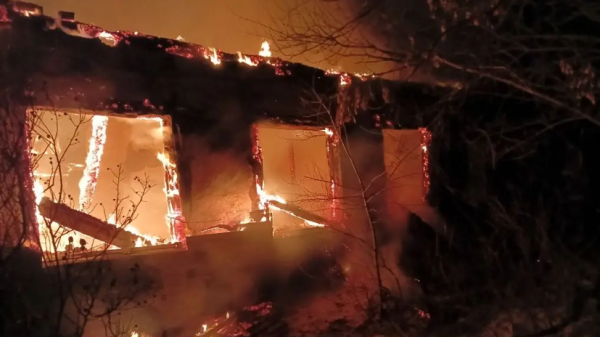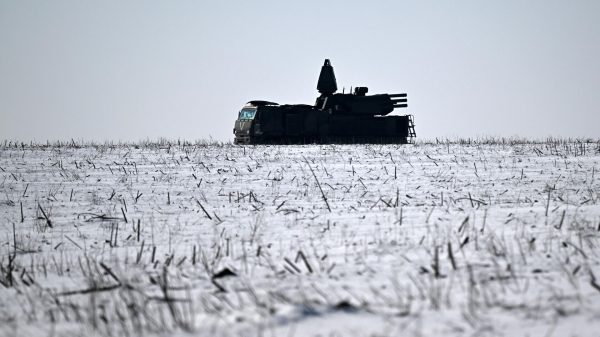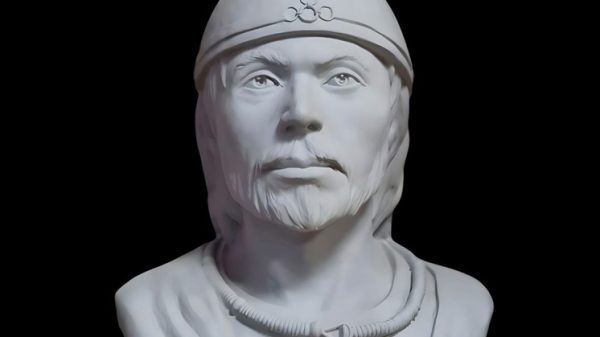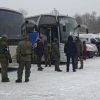 British Army personnel visit a winter camp near Tapa, Estonia, in February 2024. The military exercises are designed to test and demonstrate NATO's actions' Russia's ability to protect the Alliance's eastern flank. Photo: VALDA KALNINA/EPA-EFE/SHUTTERSTOCK/SHUTTERSTOCK
British Army personnel visit a winter camp near Tapa, Estonia, in February 2024. The military exercises are designed to test and demonstrate NATO's actions' Russia's ability to protect the Alliance's eastern flank. Photo: VALDA KALNINA/EPA-EFE/SHUTTERSTOCK/SHUTTERSTOCK
NATO must be prepared for Russia to launch an “existential” war against the Baltic states, “disguised in a storm of disinformation.” «, the ambassadors of the three countries warned.
Writing exclusively for The Sunday Telegraph, top UK diplomats from Estonia, Latvia and Lithuania said Russia could “quickly turn around” from Ukraine and invade the Baltics. .
And they said that Vladimir Putin's cruelty towards Ukraine brings back the three countries' «darkest memories» of the occupation under Stalin.
Estonian Ambassador Vilar Lubi, Latvian Ambassador Ivita Burmistra and Lithuania's Chargé d'Affaires Lina Zigmantaite wrote a joint article to mark Friday's 20th anniversary of their countries joining NATO.
The ambassadors said that joining the alliance meant their countries had never had «stronger collective security» than they do today, but «nor have we faced a greater threat.»
By hitting other European countries that had downplayed risk from Russia, they said: «Our warnings about the latent and growing threat from the East were too easily ignored in some Allied capitals.»
“We knew then, just as we know today, that only collective defense can guarantee security in Europe. We lacked this in the 1930s, and we paid a heavy price; the one that Ukrainians are now paying.»
 Latvian army personnel hold Latvian and NATO flags as Latvia celebrates the anniversary of joining NATO . Alliance in Riga, March 28, 2024. Photo: INTS KALNINS/REUTERS/REUTERS
Latvian army personnel hold Latvian and NATO flags as Latvia celebrates the anniversary of joining NATO . Alliance in Riga, March 28, 2024. Photo: INTS KALNINS/REUTERS/REUTERS
The ambassadors said the «torment» Ukraine is currently experiencing in the form of «deportations, torture, child abductions» and «cultural erasure» has awakened their countries' «darkest memories and fears» — an apparent reference to the Soviet occupation. in the Baltic states, which began in 1940.
Warning that Russia could try to invade again, they said: “We are acutely aware that Russia's war economy and battle-hardened armed forces could quickly turn from the south to west. .
“We agree with intelligence assessments that an acute strategic challenge to our defense and deterrence could arise in as little as three years or less. We, on the eastern shore of the Baltic Sea, have few natural borders and nowhere to retreat.”
With countries already exposed to “hybrid attacks” such as cyber warfare “on a daily basis”, they warned that the “existential challenge” to them independence “may seem ambiguous at first, masked by a barrage of misinformation and other distractions.”< /p>
“In such circumstances, confusion means defeat. Therefore, we – and our allies – must be prepared to respond quickly, convincingly and effectively to all types of threats.”
To contain Russia, they called for “faster decision-making” within NATO and for everyone. members «to invest in forces and equipment to implement the alliance's new defense plans.»
The ambassadors said the «frontline» Baltic states were «stepping up our game, ready to fight to defend every inch and every soul» and «NATO must do the same.» They also said that NATO leadership needs a “strong” UK.
Regarding Ukraine, they said Russia “cannot be allowed to win.” The ambassadors said that Ukraine's future entry into NATO would not only protect the country from further Russian aggression, but also strengthen the alliance, since «as a battle-hardened ally, Ukraine will make a significant contribution to our security.»
 People attend the celebration of the 20th anniversary of Lithuania's NATO membership in front of the Presidential Palace in Vilnius, March 29. 2024 Photo: Mindaugas Kulbis/AP/AP
People attend the celebration of the 20th anniversary of Lithuania's NATO membership in front of the Presidential Palace in Vilnius, March 29. 2024 Photo: Mindaugas Kulbis/AP/AP
They added: “A clear path to Ukraine's membership must be a priority at the alliance's 75th anniversary summit in Washington this summer.”
Ambassadorial intervention has already occurred. at a time of growing concern about Ukraine's ability to continue resisting Russia and uncertainty about the future of NATO.
A $60bn (£45.9bn) US military aid package for Ukraine is still stuck in Congress. At the same time, NATO members are feverishly preparing for the possible re-election of Donald Trump, who has previously flirted with the idea of leaving the alliance.
The diplomats' reference to a «strong» UK and the need to «invest» is likely to be interpreted as a call to Britain to increase its defense spending.
In recent weeks the government has been criticized by its own MPs for failing to find more money for the armed forces in the budget.
Currently Britain spends about 2 percent of GDP on its military, but three former Conservative Party defense ministers have said a 3 percent pledge should be included in the election manifesto — it's an idea. supported by incumbent President Grant Shapps.
In an interview with The Telegraph earlier this month, Latvian Foreign Minister Krisjanis Karins called on the UK to consider following suit and reinstating conscription to deter Russia.























































Свежие комментарии